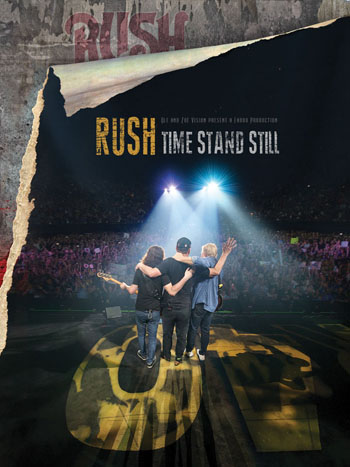Let's Geddy Up With Rush: Time Stand Still
By Steve Newton, GeorgiaStraight.com, October 26, 2016

I was a rock-crazed 17-year-old when the first Rush album came out in 1974, so of course I became an instant fan. And that was even before they latched on to the wildest drummer this side of Keith Moon.
Paul Rudd was only four years old when the first Rush album came out, so he was a bit later to the party, but his affection for the band—as dramatized in the 2009 bromantic comedy I Love You, Man—has been verified. The actor was a worthy choice to narrate this sharply edited and extremely insightful doc, which follows the Canuck prog-rock greats on their “final” tour last year.
The main theme of Rush: Time Stand Still is devotion: both that required by the band to stay together for 40 years—while always doing things its own way—and that shown by its biggest fans, notoriously hard-core followers. Written by Canadian musician-author Dave Bidini, it goes deep into the backstage realities of touring life, inserting interviews with everyone from perennial manager Ray Danniels on down to the truck driver who's been hauling their gear since '76.
A lot of screen time is also given to those most ardent of fans, like the guy from Scotland who barely survived a horrific car crash and used constant heavy doses of Rush music to help heal himself.
The conversations with the band members themselves—singer-bassist Geddy Lee, guitarist Alex Lifeson, and drummer Neil Peart—reveal them all to be thoughtful, articulate artists who somehow manage within the high-pressure world of rock never to take themselves too seriously. That could be the secret to their longevity, you start to think.
Particularly interesting are the sequences detailing avid biker Peart's determination to carefully map out routes on which to ride his motorcycle hundreds of miles between gigs, rather than flying, even after drumming his ass off for three hours straight.
The movie is preceded by the 20-minute short “Rush: A Salute to Kings”, which features rockers like Gene Simmons of Kiss and Scott Gorham of Thin Lizzy offering recollections of first seeing and/or touring with Rush in the '70s. Gorham's appearance gave me hope that someday someone might make a similar film about Thin Lizzy because, at their peak, they were an even better live band than Rush.
But that's a pointless argument for another day, I suppose.